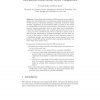Free Online Productivity Tools
i2Speak
i2Symbol
i2OCR
iTex2Img
iWeb2Print
iWeb2Shot
i2Type
iPdf2Split
iPdf2Merge
i2Bopomofo
i2Arabic
i2Style
i2Image
i2PDF
iLatex2Rtf
Sci2ools
CRYPTO
2000
Springer
2000
Springer
Parallel Reducibility for Information-Theoretically Secure Computation
Secure Function Evaluation (SFE) protocols are very hard to design, and reducibility has been recognized as a highly desirable property of SFE protocols. Informally speaking, reducibility (sometimes called modular composition) is the automatic ability to break up the design of complex SFE protocols into several simpler, individually secure components. Despite much effort, only the most basic type of reducibility, sequential reducibility (where only a single sub-protocol can be run at a time), has been considered and proven to hold for a specific class of SFE protocols. Unfortunately, sequential reducibility does not allow one to save on the number of rounds (often the most expensive resource in a distributed setting), and achieving more general notions is not easy (indeed, certain SFE notions provably enjoy sequential reducibility, but fail to enjoy more general ones). In this paper, for information-theoretic SFE protocols, we • Formalize the notion of parallel reducibility, where ...
Related Content
| Added | 02 Aug 2010 |
| Updated | 02 Aug 2010 |
| Type | Conference |
| Year | 2000 |
| Where | CRYPTO |
| Authors | Yevgeniy Dodis, Silvio Micali |
Comments (0)

